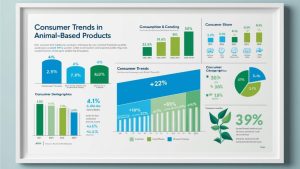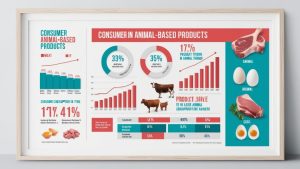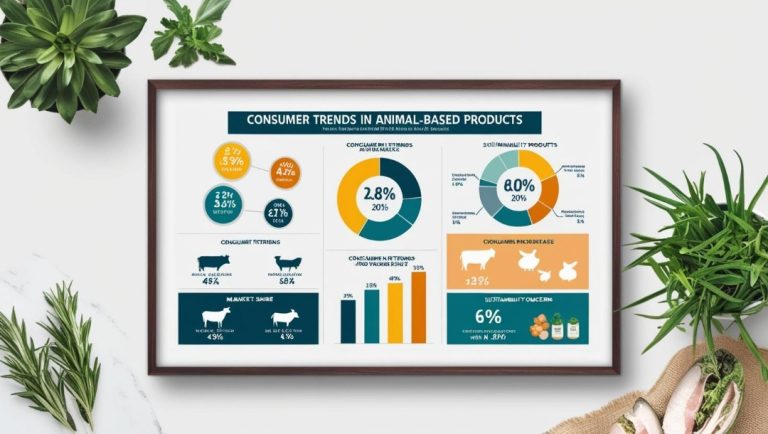Consumer preferences for animal-based products have evolved significantly in recent years. With changing dietary habits, increased health awareness, and growing concerns over sustainability and animal welfare, the livestock and poultry industries are adapting to meet new demands. Consumers are increasingly looking for products that align with their values, whether it’s organic meat, antibiotic-free dairy, ethically raised poultry, or alternative protein options.
This article explores the latest consumer trends in animal-based products, examining factors such as health consciousness, sustainability, ethical concerns, technological advancements, and regulatory influences.
Click HERE to join our WhatsApp group chat
Shift Toward Health-Conscious Consumption
a) Demand for Nutrient-Rich Animal Products
Consumers are seeking high-protein, nutrient-dense products such as lean meats, omega-3-enriched eggs, and fortified dairy.
Functional foods, including probiotic-rich yogurts and collagen-boosting bone broths, are gaining popularity.
b) Preference for Antibiotic-Free and Hormone-Free Products
Growing concerns over antibiotic resistance and synthetic hormone use have led to increased demand for antibiotic-free and hormone-free meats and dairy.
Labels such as “No Antibiotics Ever” and “rBGH-Free Milk” influence purchasing decisions.
c) Organic and Grass-Fed Products
Consumers perceive organic, pasture-raised, and grass-fed products as healthier and more natural.
The market for organic dairy, free-range eggs, and grass-fed beef is expanding rapidly.
READ ALSO: Alternative Feed Resources for Cost Reduction
Sustainability and Environmental Concerns
a) Preference for Sustainable and Regenerative Farming
Consumers are supporting brands that prioritize sustainable livestock farming, including regenerative agriculture practices that restore soil health and reduce carbon footprints.
Sustainable seafood and ethically sourced meats are becoming a key focus for environmentally conscious buyers.
b) Reduced Meat Consumption and Flexitarianism
While demand for high-quality meat remains, many consumers are reducing their intake in favor of a “flexitarian” diet, which balances plant-based foods with occasional meat consumption.
Interest in plant-forward diets has led to the rise of blended meat products (e.g., beef-mushroom burgers).
c) Carbon Footprint Awareness
Consumers are increasingly aware of the environmental impact of livestock farming, including greenhouse gas emissions from cattle production.
Brands that provide carbon footprint data and adopt eco-friendly practices are gaining market traction.
READ ALSO: Common Quail Diseases and Their Treatment
Ethical and Animal Welfare Considerations

a) Higher Standards for Animal Welfare
Consumers are favoring products with third-party certifications like Certified Humane, Animal Welfare Approved, and Free-Range.
Companies are shifting toward cage-free eggs, crate-free pork, and humane slaughter methods to meet these expectations.
b) Traceability and Transparency in Supply Chains
Shoppers want to know the origin of their meat and dairy products, leading to increased demand for farm-to-table and traceable sourcing.
QR codes on packaging, blockchain technology, and farm traceability apps are becoming common in the industry.
c) Ethical Branding and Storytelling
Brands that highlight their commitment to ethical treatment of animals and responsible farming practices are resonating with consumers.
Marketing campaigns emphasizing farm stories, traditional animal husbandry, and community engagement are effective.
Technological Innovations in Animal-Based Products
a) Precision Nutrition and Biofortified Foods
Innovations in livestock nutrition have enabled the production of biofortified animal products, such as selenium-enriched eggs and DHA-enhanced milk.
Smart farming techniques optimize animal diets for better health and nutritional profiles.
b) Lab-Grown Meat and Alternative Proteins
While traditional meat consumption remains high, cultivated (lab-grown) meat and insect-based proteins are emerging as viable alternatives.
Hybrid products that combine plant and animal proteins cater to health-conscious and environmentally aware consumers.
READ ALSO: Introduction to Organic Livestock Farming
c) Smart Packaging and Digital Engagement
Interactive packaging with scannable QR codes provides consumers with real-time information on sourcing, nutrition, and sustainability practices.
Augmented reality (AR) experiences and blockchain tracking are gaining traction.
Regulatory and Certification Influence on Consumer Choices

a) Influence of Food Safety Regulations
Stricter food safety standards and quality control measures are boosting consumer confidence in branded and certified animal-based products.
Countries with stringent regulations on antibiotics and feed additives see greater demand for compliance-certified products.
b) Organic and Non-GMO Certifications
Non-GMO labeling, USDA Organic certification, and European organic seals are becoming key factors in purchasing decisions.
Consumers prefer brands that voluntarily disclose third-party testing and certification results.
c) Halal and Kosher Meat Trends
Religious and cultural dietary preferences continue to shape market demand for Halal and Kosher-certified meats.
Ethical slaughter practices and transparency in religious certification processes are crucial for consumer trust.
READ ALSO: Bovine Respiratory Disease: Causes and Management
The Role of Digital and E-Commerce in Consumer Preferences
a) Growth of Online Meat and Dairy Sales
E-commerce platforms, direct-to-consumer (DTC) models, and online grocery deliveries are transforming how consumers purchase animal-based products.
Subscription services for premium meats, dairy alternatives, and specialty cheeses are thriving.
b) Influence of Social Media and Food Influencers
Food bloggers, nutritionists, and social media influencers play a significant role in shaping consumer choices.
Instagram, TikTok, and YouTube are key platforms where consumers discover and evaluate new animal-based products.
c) Personalized Nutrition and AI-Driven Recommendations
AI-powered meal planning apps suggest specific animal-based products based on individual dietary needs and preferences.
Personalized protein recommendations are gaining traction in fitness and wellness communities.
Conclusion
Consumer trends in animal-based products are evolving in response to health, sustainability, ethical, and technological influences. The demand for antibiotic-free, organic, and ethically sourced products continues to grow, while concerns over environmental impact and animal welfare drive shifts in consumption habits. Innovations such as precision nutrition, lab-grown meat, and smart packaging are shaping the future of the livestock and poultry industries.
Farmers, food producers, and retailers must adapt to these changing trends by prioritizing transparency, ethical sourcing, and sustainability to remain competitive in the dynamic market landscape. By understanding and responding to consumer preferences, the industry can ensure long-term growth and profitability.
READ ALSO: Artificial Insemination in Livestock and Poultry
Artificial Insemination (AI) is a widely used reproductive technology in livestock and poultry farming that involves the manual deposition of semen into the reproductive tract of a female animal using specialized equipment. AI has revolutionized breeding programs by improving genetic quality, enhancing productivity, and controlling diseases…
READ ALSO: Zoonotic diseases in Livestock and Poultry
Zoonotic diseases, also known as zoonoses, are infections that can be transmitted between animals and humans. These diseases pose significant risks to public health, food security, and economic stability, particularly in regions where livestock and poultry farming are integral to livelihoods. Understanding zoonotic diseases in livestock and poultry is crucial for preventing outbreaks, ensuring safe animal production, and protecting human health…
Click HERE to join our WhatsApp group chat

